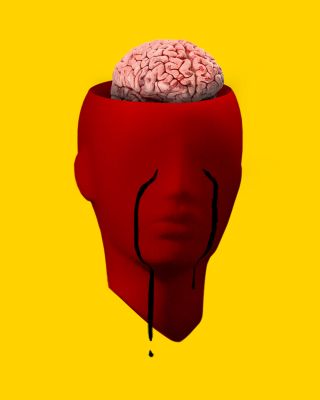Education
Keith Johnstone’s Improv Wisdom Lives On
A Personal Perspective: What the improv pioneer taught me about life.
Posted June 10, 2023 Reviewed by Vanessa Lancaster
Key points
- Improv legend Keith Johnstone died on March 11, 2023 at the age of 90.
- Johnstone's contributions to improv include ideas about status, trance, creativity, and storytelling.
- Johnstone advocated entering scenes blank and tapping into our unconscious selves.

I was lucky enough to take a Keith Johnstone improv workshop in Berlin in 2011. I was traveling the world researching the psychology of improv for my doctoral dissertation, and Keith Johnstone was a non-negotiable. I knew I had to learn straight from the expert.
1. Clear Your Head
He did not disappoint. During one exercise, Keith stopped me seconds after I started a scene. He said he could tell I was pre-scripting what I would say or, in improv parlance, “in my head.” He made me restart, but this time, totally blank, with absolutely no idea how I might kick off the scene.
This is one of the improv life lessons I go back to again and again. How can I clear my head and enter real-life scenes with a totally open mind? We pre-script life in so many ways. We plan what we will say before making that phone call and plot how we will have that tough conversation. Sometimes that works, but other times, Keith’s wisdom of starting scenes totally blank can help us be more in the moment and receptive to the people around us. It can help us stay open and present.
2. Be Naughty
Another moment from the workshop stands out. He led an exercise where we had to play two characters: our regular self and our naughty self. I write about this moment in Theatrical Improvisation, Consciousness, and Cognition because it was, quite frankly, a wild experience, an experience that gets to the core of how transformative and freeing improv can be. I don’t remember what my scene was about, but I know that at one point, I mimed dropping my pants and, let’s just call it, “waggling.”
When the scene ended, I was shaken and shocked to have done something so vulgar, but Keith wasn’t at all surprised. This was the whole point of his exercise. He delved deeply into mask work and exercises like the naughty self one to help actors unlock other facets of themselves and to disconnect from the strict identity they usually cling to.
I do versions of Keith’s naughty self-exercise in my daily life. I tap into my stupid self before I start writing and my naughty self to be more fun at dinner parties. Try it. Have a conversation with your two selves and see what happens.
Regular Self: I want to write about Keith Johnstone, but it feels intimidating.
Stupid Self: Just write about that workshop you took.
RS: I would want to connect that with something bigger and more meaningful.
SS: The workshop was cool.
RS: Sure, but I need an angle.
SS: Workshop cool. Pull pants down. Keith making fun of himself. You talk about it all the time.
These conversations with myself, when my alternative self has made outlandish suggestions, have turned into many of my favorite blog moments: writing about Lizzo, quoting Taylor Swift, and analyzing Lady Gaga. Apparently, my alter ego loves pop music, and he usually dares me to sprinkle in elements that “shouldn’t go in Psychology Today posts.” This naughtiness helps me be more creative and allows my writing to sound more personal.
3. Be Human, Be Humble
One of Keith Johnstone’s significant contributions to improv was his status work, and I also got to experience this firsthand. During the workshop, Keith fumbled his words and asked students for help. He later revealed that he intentionally lowered his status to help take the pressure off us. If we were intimidated by Keith Johnstone, the put-together improv guru, we wouldn’t be as likely to take chances and make mistakes. So he played up the bumbling old man routine (by his own admission), allowing us to raise our status and improvise freely and fully.
I think about this status shift all the time when I’m teaching. I lean into my vulnerability and humanness and happily let my students raise their status to become more engaged in their own learning. I admit when I don’t know an answer or don’t know how to spell something. I play up moments when I’m confused or forgetful, and this helps my students step up and help out.
Losing a Legend
Keith Johnstone died on March 11 at the age of 90, but his legacy will endure. The list of Keith Johnstone's wisdom goes on and on. He believed that everyone was creative and that everyone was a storyteller. If you want to be truly inspired to be your most authentic and creative self, read his seminal book Impro. If you want to learn how to harness improv to become a better writer and storyteller, read Impro for Storytellers.
We lost an improv titan, but he inspired countless people (myself included) to jump up, take risks, clear their heads, tap into their unconscious, tell their stories, and act a fool. He taught us how to improvise.
References
Drinko, C. (2013). Theatrical improvisation, consciousness, and cognition. Springer.
Genzlinger, N. (2023, April 14). Keith Johnstone, Champion of Improvisational Theater, dies at 90. The New York Times. https://www.nytimes.com/2023/04/14/theater/keith-johnstone-dead.html
Johnstone, K. (2014). Impro for storytellers. Routledge.
Johnstone, K. (2012). Impro: Improvisation and the theatre. Routledge.




